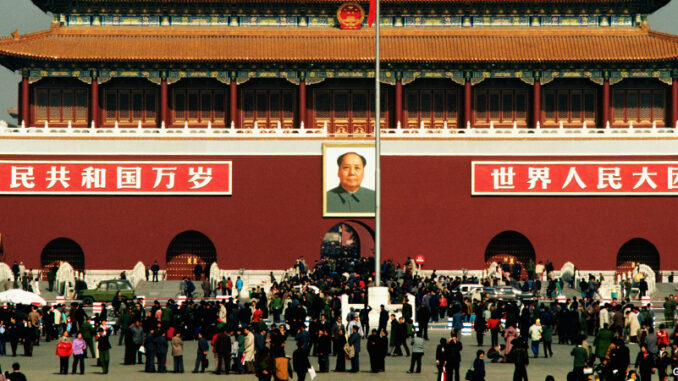
25th anniversary of Tiananmen Square Massacre
On April 15, 1989 former Chinese Communist Party chief Hu Yaobang died of a heart attack. Although he had been forced to resign by the government, he was popular among the people who wished for more Western-style freedoms. To mourn his death, more than 50,000 students gathered in Beijing’s Tiananmen Square. While together, they drafted a petition containing a list of demands for the current government including an end to corruption. The protests spread across China for the next several weeks. On June 4, 1989 the government sent troops to clear the square, firing into the crowd. The exact number of deaths is still not known, but the estimated number was reported between 300 and 2,600. More than 10,000 were arrested. In response, the United States imposed economic sanctions against China.
Twenty-five years later, the massacre at Tiananmen Square is rarely acknowledged in China, as the government strictly prohibits public discussion of the incident. After the White House made a public statement urging China to officially account for those killed in the massacre, the Chinese Foreign Ministry testily responded by demanding the U.S. not make comments related to China’s internal politics. In addition, periodicals such as The New York Times and news websites are blocked, as are most social media such as Facebook, Twitter and Instagram.
Dig Deeper Despite censorship in China, tens of thousands gathered in Hong Kong to mark the 25th anniversary of the massacre. Find out what current-day activists hope to achieve by acknowledging the event.
The EPA’s New Plan
Climate change continues to be a heated topic. In response to President Obama’s plan to reduce the impacts of climate change, the Environmental Protection Agency (EPA) has introduced a Clean Power Plan. Under this new rule, power plants in the United States are required to reduce their carbon emissions by one-third by the year 2030. Currently, about 40 percent of carbon pollution is created by power plants. These plants can reduce their emissions in different ways. Two examples are capturing the emissions and turning it into liquid that can be stored under ground, or by using tools called scrubbers that remove toxins like mercury.
So there is a lot of talk out there about the importance of minimizing carbon emissions, but what you does this mean exactly? In a nutshell, energy is created by burning fossil fuels, either directly (in a furnace boiler or in operating a vehicle) or indirectly (by power stations that generate the electricity we use or in the manufacture of our food and services we consume). While carbon dioxide (CO2) is a natural part of the Earth’s atmosphere, human activity is adding more to the atmosphere than can be absorbed by plants. CO2 emissions in the United States alone has increased by 5% between 1990 and 2012.
Dig Deeper Take a look at President Obama’s action plan on climate change. Keep track of the ongoing legal measures to combat the lasting effects.
Latest Jobs Report

Economists and lawmakers pay particularly close attention to the monthly Jobs Report issued by the U.S. Bureau of Labor Statistics (BLS) as a way to determine the current state of our economy. May turned out to be better than most had predicted, with 217,000 jobs added. This was 2,000 more than expected. This was also the fourth consecutive month that job growth reached above 200,000. The 8.7 million jobs lost during the recession have finally been fully recovered. Business and professional added the most jobs in May with 55,000, followed by healthcare with 34,000.
However, unemployment remains unchanged at 6.3%. The labor force participation rate (the number of people who either have or are actively looking for jobs) also remained the same. The BLS reported that 7.3 million job holders are working part-time, causing economists to wonder if this is by choice or because their hours were cut or because it was all they could find despite wanting to work full-time. The average work week remained steady at an average of 34.5 hours and hourly earnings rose five cents to an average of $24.38.
What Do You Think? Do you have a summer job? If so, how difficult was it to secure? If not, did you want one and not able to find one? Explain your answer.
Controversy Over Sgt. Bergdahl
In the last issue of Stuff YOU Should Know, btw brought you news of a prisoner swap between the United States and the Taliban. In the days that followed the release of American Army Sgt. Bowe Bergdahl, there have been a growing number of questions and concerns. One of the first to be raised was the suspicion that he had gone AWOL (Absent Without Leave, meaning gone without asking permission). There is also controversy over the fact that at least six soldiers are said to have been killed in searching for Bergdahl since 2009. Political critics believe that President Obama broke the law by not giving Congress the required 30-day notice to release prisoners from Guantanamo Bay.
In response to criticism, military officials have made public announcements clarifying their actions. The release of Bergdahl in exchange for the Taliban Five was arranged as a way to foster productive negotiations between Afghanistan and the Taliban. While it is still not clear why Bergdahl left the camp on the night that he did, he was never officially classified as a deserter. Army officials have also said that there is no evidence to support the deaths of soldiers linked to Bergdahl’s search. The Obama Administration defended the President’s action by stating that he had the right override the 30-day requirement for special considerations.
